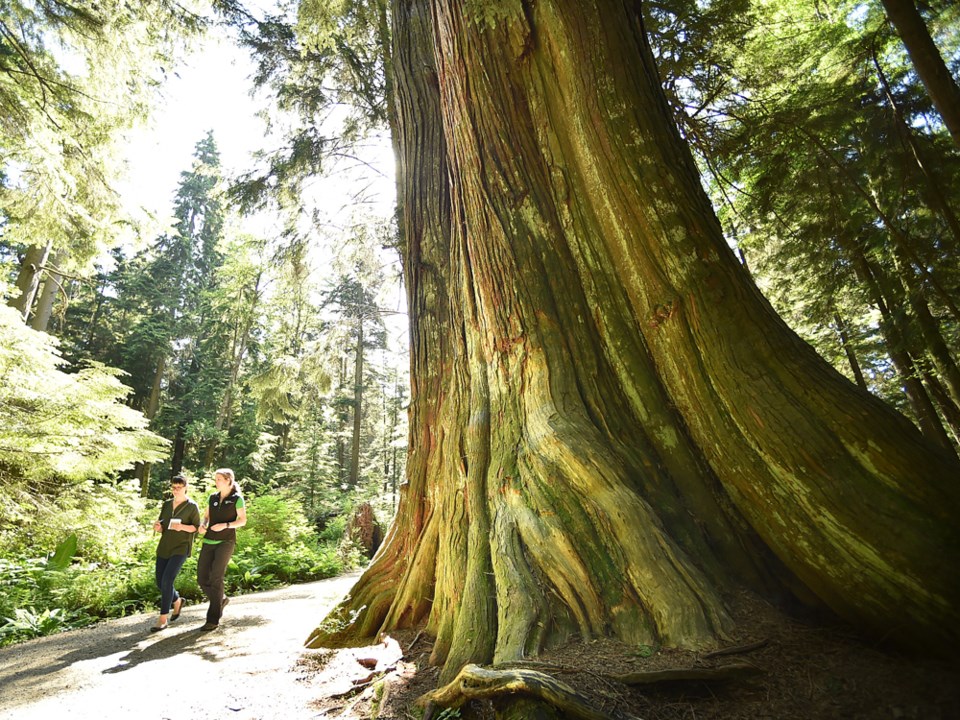It’s all about the trees in Stanley Park this weekend.
The Stanley Park Ecological Society, in partnership with Vancouver Park Board, BC Big Tree Registry, Ancient Forest Alliance and Bartlett Tree Experts, is presenting the fourth annual Big Tree Weekend with free family-friendly events throughout Saturday and Sunday.
The most popular event is the Tour the Giants walking tours. The society has three of the two-hour tours scheduled for Saturday. All three tours are currently sold out but there is a waiting list.
The tour includes a closer look at some of the largest trees in the park.
“We have the biggest maple on earth in the park,” said Celina Starnes, public education and outreach manager with the society.
Deciduous trees don’t live as long as evergreens, but this maple is likely more than 100 years old, she said.
“And probably the biggest red alder is on that tour, and that’s right at the water’s edge at Third Beach,” Starnes said. “That one’s shocking.”
The oldest and largest trees in the park have survived a lot over the years — logging, fires and storms, including the massive windstorm in December 2006 that knocked down thousands of trees.
“[There are trees that have survived] all of those assaults,” Starnes said.
In the mid-1800s there were five different logging companies that were given leases to log in what is now known as Stanley Park.
“They did a great job, they removed most of the big trees,” she said. However, the logging practices at the time helped some of the park’s current oldest residents survive for more than 100 years.
Companies at the time were more selective. Instead of clear cutting, logging operations would pick and choose the biggest and best looking trees. Trees that were too small or had imperfections were left behind.
“You could imagine how big the ones that they did remove were… the trees were so plentiful at the time in the province that they could be choosy.”
There are a number of big tree events set for Sunday, including:
- Big Tree Birds – this two-hour tour is by donation and gives participants the chance to learn about bird identification and behaviour, as well as comparing species in the edge habitat versus the interior forest, and chance a glimpse at the park’s birds that have a taste for the high canopy.
- Canopy Creatures – participants will get to know the secret world of Stanley Park’s tree canopy and its tree-top denizens, from flying squirrels to bald eagles, learning how to discern the wildlife signs signaling their presence and visit the park’s most prominent eagle nests.
- Canopy Climb – A team of canopy technicians from Bartlett Tree Experts will make their fourth annual ascent up some of the biggest trees in the park. While participants will have to leave the climbing to the experts, they will be able to investigate the ecological systems sustained in the canopy through the samples collected. The team uses ecologically sensitives climbing techniques to explore and expose the importance of the micro-environments of these big trees.
- Hollow Tree Chorale – Presented by “Birds in Residence” an Artists in Communities project, participants will enter the park’s storied Hollow Tree and sing along with local song birds.
- The Hollow Tree & Friends – Bill Stephen, urban forestry specialist with the Vancouver Park Board, will share the story of the park’s Hollow Tree followed by a trek deep into the forest to discover some of Stanley Park’s biggest trees. This event is sold out but interested participants can join the waiting list.
For more information about any of the events visit stanleyparkecology.ca/education/public-programs/big-tree-weekend-2018.
jkerr@vancourier.com



